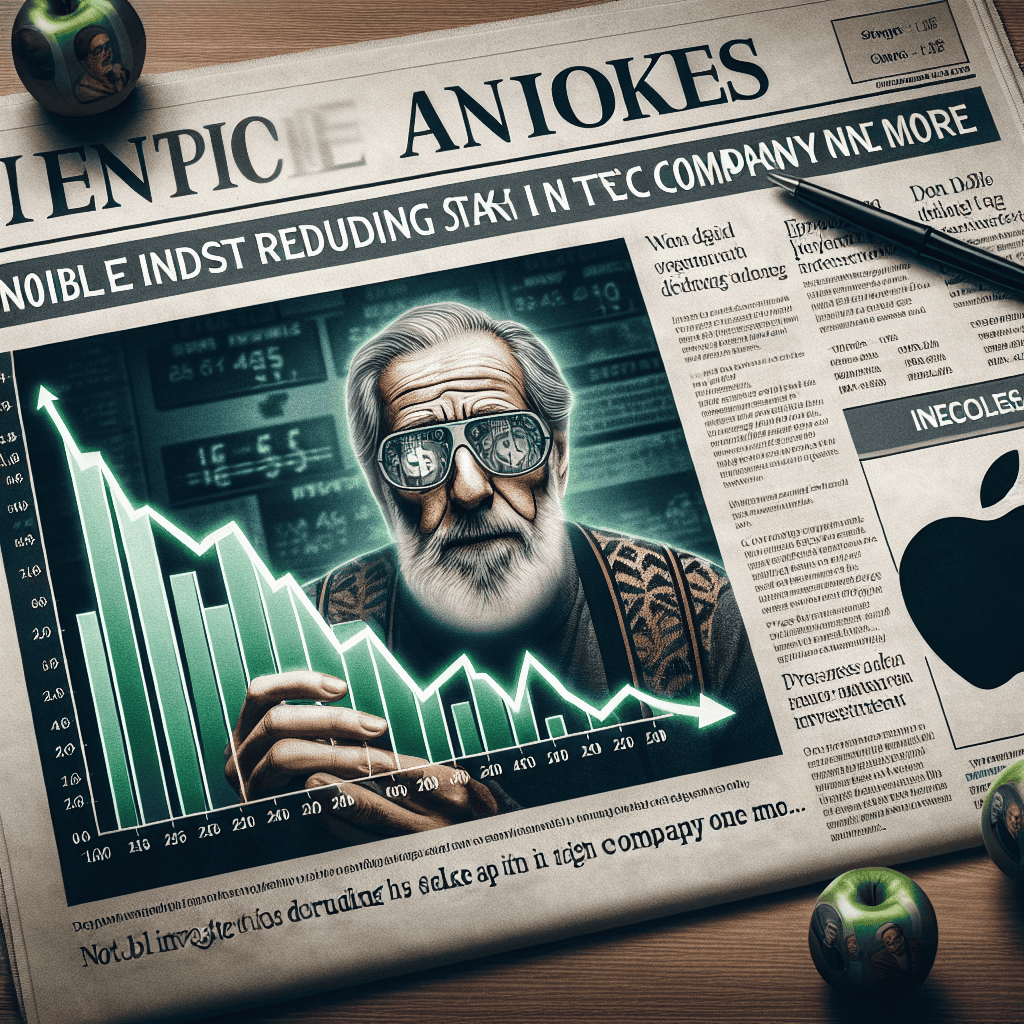“Berkshire’s Earnings Dip: Buffett Trims Apple Stake, Shifts Strategy”
Introduction
Berkshire Hathaway, the multinational conglomerate led by renowned investor Warren Buffett, recently reported a notable decline in its earnings, drawing significant attention from the financial community. This downturn comes amid Buffett’s strategic decision to further reduce Berkshire’s substantial stake in Apple Inc., a move that has sparked widespread speculation and analysis. As one of the most influential figures in the investment world, Buffett’s actions are closely watched, and his decision to trim holdings in Apple—a company that has been a cornerstone of Berkshire’s portfolio—signals a potential shift in strategy. The earnings drop, coupled with the reduction in Apple shares, highlights the dynamic nature of Berkshire’s investment approach and raises questions about the future direction of the conglomerate’s portfolio management.
Impact Of Warren Buffett’s Apple Stake Reduction On Berkshire’s Earnings
Berkshire Hathaway, the multinational conglomerate led by the legendary investor Warren Buffett, recently reported a decline in its quarterly earnings, a development that has captured the attention of investors and analysts alike. This downturn in earnings is closely linked to Buffett’s decision to further reduce Berkshire’s stake in Apple Inc., a move that has significant implications for the company’s financial performance and investment strategy. As one of the most influential figures in the world of finance, Buffett’s investment decisions are often scrutinized for their potential impact on the market and the companies involved.
Apple has long been a cornerstone of Berkshire Hathaway’s investment portfolio, representing a substantial portion of its equity holdings. The technology giant’s consistent performance and robust growth have contributed significantly to Berkshire’s earnings over the years. However, Buffett’s recent decision to trim the company’s stake in Apple has raised questions about the rationale behind this move and its potential consequences. While the reduction in Apple’s stake may seem counterintuitive given the company’s strong market position, it is essential to consider the broader context of Berkshire’s investment strategy.
One possible explanation for the reduction is Buffett’s well-documented approach to portfolio diversification. By decreasing Berkshire’s reliance on a single company, even one as successful as Apple, Buffett may be seeking to mitigate risk and ensure a more balanced distribution of assets. This strategy aligns with his long-standing investment philosophy, which emphasizes the importance of maintaining a diversified portfolio to weather market fluctuations and economic uncertainties. Furthermore, the decision to reduce the Apple stake could be part of a broader effort to reallocate capital towards other investment opportunities that Buffett and his team deem promising.
In addition to diversification, another factor that may have influenced Buffett’s decision is the valuation of Apple shares. With Apple’s stock price reaching new heights in recent years, Buffett might have considered the shares to be overvalued, prompting him to lock in profits and reduce exposure. This move would be consistent with his value investing principles, which prioritize purchasing undervalued stocks with strong growth potential. By selling a portion of Berkshire’s Apple holdings, Buffett could be capitalizing on the company’s impressive market performance while seeking new opportunities that offer better value.
The impact of this decision on Berkshire’s earnings is multifaceted. On one hand, the reduction in Apple’s stake has led to a decrease in the company’s equity income, contributing to the overall decline in earnings. On the other hand, the capital generated from the sale of Apple shares provides Berkshire with additional liquidity, which can be deployed in various ways to enhance shareholder value. This flexibility allows Buffett to explore new investments, pursue acquisitions, or return capital to shareholders through buybacks or dividends.
In conclusion, Warren Buffett’s decision to reduce Berkshire Hathaway’s stake in Apple has had a noticeable impact on the company’s earnings, reflecting the intricate balance between risk management, valuation considerations, and strategic capital allocation. While the immediate effect on earnings may be negative, the long-term implications of this move could prove beneficial if Berkshire successfully identifies and capitalizes on new investment opportunities. As always, Buffett’s actions underscore the importance of a disciplined and thoughtful approach to investing, one that prioritizes long-term value creation over short-term gains.
Analyzing The Financial Implications Of Berkshire’s Earnings Drop
Berkshire Hathaway, the multinational conglomerate led by the legendary investor Warren Buffett, recently reported a notable decline in its quarterly earnings, a development that has captured the attention of investors and analysts alike. This earnings drop is particularly significant as it coincides with Buffett’s decision to further reduce Berkshire’s stake in Apple, a move that has sparked considerable discussion regarding the financial implications for the conglomerate. Understanding the factors contributing to this earnings decline and the strategic rationale behind the reduction in Apple holdings is crucial for comprehending the broader financial landscape in which Berkshire operates.
To begin with, Berkshire Hathaway’s earnings are influenced by a myriad of factors, including the performance of its diverse portfolio of subsidiaries and investments. The conglomerate’s holdings span various industries, from insurance and energy to railroads and consumer goods. Consequently, fluctuations in any of these sectors can have a pronounced impact on the company’s overall financial performance. In the recent quarter, several of Berkshire’s subsidiaries faced challenges, including increased costs and supply chain disruptions, which collectively contributed to the earnings decline. Moreover, the broader economic environment, characterized by inflationary pressures and interest rate hikes, has also played a role in shaping the financial outcomes for many of Berkshire’s businesses.
In parallel with these operational challenges, Warren Buffett’s decision to reduce Berkshire’s stake in Apple has added another layer of complexity to the financial narrative. Apple has long been a cornerstone of Berkshire’s investment portfolio, and its performance has significantly bolstered the conglomerate’s earnings in recent years. However, Buffett’s gradual reduction of Berkshire’s Apple holdings suggests a strategic recalibration. While some may interpret this move as a lack of confidence in Apple’s future prospects, it is essential to consider Buffett’s investment philosophy, which emphasizes value and long-term growth. By trimming the Apple stake, Buffett may be seeking to diversify Berkshire’s portfolio further, thereby mitigating potential risks associated with over-reliance on a single asset.
Furthermore, the decision to reduce the Apple stake could be viewed in the context of capital allocation strategies. Buffett has consistently demonstrated a keen ability to identify undervalued opportunities and allocate capital where it can generate the most substantial returns. By freeing up capital from Apple, Berkshire may be positioning itself to seize new investment opportunities that align with its long-term objectives. This approach underscores the importance of adaptability and strategic foresight in navigating the ever-evolving financial landscape.
In addition to these strategic considerations, it is crucial to recognize the broader market dynamics that may have influenced both Berkshire’s earnings and the decision to adjust its Apple holdings. The technology sector, while still a powerhouse of innovation and growth, has faced increased scrutiny and volatility in recent times. Regulatory challenges, geopolitical tensions, and shifting consumer preferences have all contributed to a more complex operating environment for tech companies. As such, Buffett’s decision to reduce exposure to Apple may reflect a prudent response to these evolving market conditions.
In conclusion, Berkshire Hathaway’s recent earnings drop and the reduction of its Apple stake are emblematic of the intricate interplay between operational performance, strategic investment decisions, and broader market dynamics. While the earnings decline may raise concerns among some investors, it is essential to appreciate the strategic rationale underpinning these developments. By maintaining a focus on long-term value creation and prudent capital allocation, Berkshire Hathaway continues to navigate the complexities of the financial landscape with the seasoned acumen that has long been its hallmark.
Warren Buffett’s Investment Strategy: Why Reduce Apple Stake?
Berkshire Hathaway, the multinational conglomerate led by the legendary investor Warren Buffett, recently reported a decline in its quarterly earnings, a development that has captured the attention of investors and analysts alike. This downturn in earnings coincides with Buffett’s decision to further reduce Berkshire’s stake in Apple Inc., a move that has sparked considerable discussion regarding his investment strategy. Understanding the rationale behind this decision requires a closer examination of Buffett’s overarching investment philosophy and the current market dynamics.
Warren Buffett, often referred to as the “Oracle of Omaha,” is renowned for his value investing approach, which emphasizes the acquisition of undervalued companies with strong fundamentals and long-term growth potential. Over the years, Apple has been a cornerstone of Berkshire’s investment portfolio, contributing significantly to its overall performance. However, the recent reduction in Berkshire’s Apple holdings suggests a strategic recalibration, rather than a loss of confidence in the tech giant. This decision aligns with Buffett’s prudent approach to portfolio management, which involves periodically reassessing and rebalancing investments to optimize returns and mitigate risks.
One possible reason for the reduction in Apple’s stake is the need for diversification. While Apple has been a stellar performer, accounting for a substantial portion of Berkshire’s portfolio, maintaining a diversified investment mix is crucial for managing risk. By trimming its Apple holdings, Berkshire can reallocate capital to other promising opportunities, thereby enhancing its portfolio’s resilience against market volatility. This move reflects Buffett’s belief in the importance of not putting all eggs in one basket, even when the basket is as robust as Apple.
Moreover, the decision to reduce the Apple stake may also be influenced by the broader economic landscape. The technology sector, while still a powerhouse of innovation and growth, faces increasing regulatory scrutiny and geopolitical tensions that could impact its future trajectory. By reducing exposure to a single tech giant, Berkshire can better navigate these uncertainties and position itself to capitalize on emerging trends in other sectors. This strategic shift underscores Buffett’s adaptability and foresight in responding to evolving market conditions.
Additionally, it is worth considering the potential tax implications of such a move. Selling a portion of the Apple stake allows Berkshire to realize gains and potentially offset them against other losses, thereby optimizing its tax position. This aspect of investment strategy, often overlooked, plays a crucial role in maximizing after-tax returns and ensuring the efficient management of capital.
Furthermore, Buffett’s decision may also be driven by valuation considerations. As Apple continues to achieve remarkable success, its stock price has soared, leading to questions about its current valuation. By reducing its stake, Berkshire can lock in profits and avoid the risk of overexposure to a stock that may be perceived as overvalued by some market participants. This cautious approach aligns with Buffett’s long-standing principle of buying with a margin of safety and selling when valuations become stretched.
In conclusion, Warren Buffett’s decision to reduce Berkshire Hathaway’s stake in Apple should be viewed through the lens of his disciplined investment strategy. It reflects a careful balancing act between maintaining exposure to a high-performing asset and managing risk through diversification. By considering factors such as market dynamics, valuation, and tax implications, Buffett continues to demonstrate his acumen in navigating complex investment landscapes. As Berkshire adapts to changing conditions, investors can glean valuable insights into the art of strategic portfolio management from one of the most successful investors of our time.
The Role Of Apple In Berkshire Hathaway’s Portfolio

Berkshire Hathaway, the multinational conglomerate led by the legendary investor Warren Buffett, has long been a focal point of interest for investors and analysts alike. The company’s investment strategies and portfolio decisions are closely scrutinized, given Buffett’s reputation for astute financial acumen. Recently, Berkshire Hathaway reported a decline in its earnings, a development that coincides with Buffett’s decision to further reduce the company’s stake in Apple Inc. This move has sparked discussions about the role of Apple in Berkshire’s portfolio and the broader implications for the conglomerate’s investment strategy.
Apple has been a significant component of Berkshire Hathaway’s portfolio for several years, representing one of its largest equity holdings. The technology giant’s consistent performance and robust market position have made it an attractive investment for Berkshire, contributing substantially to the conglomerate’s earnings. However, Buffett’s decision to trim Berkshire’s Apple holdings suggests a strategic shift that warrants closer examination. While the reduction in stake might initially appear as a lack of confidence in Apple’s future prospects, it is essential to consider the broader context of Berkshire’s investment philosophy.
Buffett has often emphasized the importance of diversification and the need to balance risk and reward. By reducing the Apple stake, Berkshire may be seeking to reallocate capital to other opportunities that align with its long-term investment goals. This move could also be a reflection of Buffett’s cautious approach to managing portfolio concentration risk, ensuring that no single investment disproportionately influences the overall performance of the conglomerate. Furthermore, the decision to pare down the Apple stake might be driven by valuation considerations, as Buffett has historically been disciplined about investing in companies at prices that offer a margin of safety.
In addition to these strategic considerations, the reduction in Apple’s stake could be influenced by the evolving landscape of the technology sector. The rapid pace of innovation and the emergence of new competitors necessitate a dynamic approach to investing in tech companies. By adjusting its position in Apple, Berkshire may be positioning itself to capitalize on emerging trends and opportunities within the sector, thereby maintaining its competitive edge.
Moreover, it is important to recognize that Berkshire Hathaway’s investment strategy is not solely focused on short-term earnings fluctuations. The conglomerate’s long-term perspective allows it to navigate market volatility and economic cycles with resilience. While the recent earnings drop may raise concerns among some investors, it is crucial to view this development within the context of Berkshire’s broader investment strategy and its commitment to sustainable growth.
In conclusion, the reduction of Berkshire Hathaway’s stake in Apple reflects a nuanced approach to portfolio management, balancing the need for diversification with the pursuit of value-driven investments. While the immediate impact on earnings may be a cause for concern, it is essential to appreciate the strategic rationale behind this decision. As Berkshire continues to adapt to changing market dynamics, its investment in Apple remains a testament to the conglomerate’s ability to identify and capitalize on opportunities within the technology sector. Ultimately, the role of Apple in Berkshire’s portfolio underscores the importance of strategic flexibility and disciplined investment practices in achieving long-term success.
Market Reactions To Berkshire’s Earnings And Buffett’s Moves
Berkshire Hathaway’s recent earnings report has sent ripples through the financial markets, as the conglomerate, led by the legendary investor Warren Buffett, announced a notable decline in its quarterly earnings. This development has captured the attention of investors and analysts alike, particularly as it coincides with Buffett’s decision to further reduce Berkshire’s stake in Apple Inc., a move that has sparked considerable discussion and speculation about the future direction of both Berkshire and the broader market.
The earnings report revealed that Berkshire Hathaway’s net income fell significantly compared to the same period last year. This decline can be attributed to a combination of factors, including fluctuations in the stock market, which have impacted the value of Berkshire’s extensive investment portfolio. Additionally, the performance of some of its subsidiaries has been less robust than anticipated, contributing to the overall dip in earnings. As a result, market participants are closely scrutinizing the company’s financial health and strategic decisions.
One of the most significant aspects of the earnings report was the disclosure that Berkshire Hathaway has once again reduced its stake in Apple. This decision marks the second time in recent months that Buffett has trimmed his holdings in the tech giant, a move that has raised eyebrows given Apple’s status as one of Berkshire’s most successful investments. The reduction in Apple’s stake is seen by some as a strategic rebalancing of Berkshire’s portfolio, while others interpret it as a cautious approach in response to the tech sector’s volatility and regulatory challenges.
The market’s reaction to these developments has been mixed. On one hand, some investors view the reduction in Apple’s stake as a prudent move by Buffett, who is known for his long-term investment strategy and cautious approach to market fluctuations. By reallocating resources, Berkshire may be positioning itself to capitalize on emerging opportunities or to mitigate potential risks associated with its concentrated exposure to the tech sector. On the other hand, there are those who express concern over the implications of this decision, questioning whether it signals a lack of confidence in Apple’s future growth prospects or broader concerns about the tech industry’s trajectory.
Furthermore, the earnings drop and the reduction in Apple’s stake have prompted analysts to reassess their outlook on Berkshire Hathaway’s overall strategy. Some experts suggest that these moves reflect a broader shift in focus towards more diversified investments, potentially in sectors that are less susceptible to the rapid changes and uncertainties that characterize the technology landscape. This perspective aligns with Buffett’s historical preference for stable, income-generating assets, which may offer more predictable returns in the current economic climate.
In conclusion, the recent developments at Berkshire Hathaway have generated significant interest and debate within the financial community. As investors digest the implications of the earnings decline and the reduction in Apple’s stake, attention is likely to remain focused on Buffett’s future moves and the strategic direction of Berkshire Hathaway. While the market’s reaction has been varied, the overarching sentiment underscores the importance of adaptability and foresight in navigating the complexities of today’s investment landscape. As always, Warren Buffett’s actions will be closely watched, providing valuable insights into the evolving dynamics of the market and the strategies employed by one of its most influential figures.
Future Outlook For Berkshire Hathaway Post-Apple Stake Reduction
Berkshire Hathaway, under the stewardship of the legendary investor Warren Buffett, has long been a bellwether for the investment community. However, recent developments have raised questions about the conglomerate’s future trajectory. The company’s latest earnings report revealed a notable decline, coinciding with Buffett’s decision to further reduce Berkshire’s stake in Apple, a move that has sparked considerable discussion among analysts and investors alike. As we delve into the implications of this decision, it is essential to consider the broader context of Berkshire’s investment strategy and the potential pathways it may pursue in the coming years.
To begin with, Apple’s significance within Berkshire’s portfolio cannot be overstated. The tech giant has been a cornerstone investment, contributing significantly to Berkshire’s earnings over the past decade. Therefore, the decision to pare down this stake is not merely a routine portfolio adjustment but rather a strategic pivot that warrants closer examination. While Buffett has historically been known for his long-term investment philosophy, characterized by a preference for holding onto high-quality businesses, the reduction in Apple shares suggests a recalibration of priorities. This move may be interpreted as a response to the evolving dynamics of the technology sector, where rapid innovation and shifting consumer preferences necessitate a more agile approach.
Moreover, the earnings drop reported by Berkshire Hathaway underscores the challenges faced by the conglomerate in maintaining its historical growth trajectory. The reduction in Apple holdings, while significant, is just one piece of a larger puzzle. It is crucial to recognize that Berkshire’s diverse portfolio spans a wide array of industries, from insurance and energy to railroads and consumer goods. This diversification has traditionally been a source of strength, allowing the company to weather economic fluctuations. However, in the current economic climate, characterized by inflationary pressures and geopolitical uncertainties, even a diversified portfolio is not immune to headwinds.
In light of these challenges, the future outlook for Berkshire Hathaway hinges on its ability to adapt and innovate. One potential avenue for growth lies in the realm of renewable energy and sustainability. With increasing global emphasis on environmental responsibility, Berkshire’s energy subsidiaries could play a pivotal role in driving the company’s future earnings. Investments in wind and solar power, as well as advancements in energy storage technologies, could position Berkshire as a leader in the transition to a greener economy.
Additionally, Berkshire’s substantial cash reserves provide a strategic advantage, offering the flexibility to capitalize on opportunistic acquisitions. In an environment where valuations in certain sectors may become more attractive, Berkshire’s ability to deploy capital efficiently could yield significant returns. Furthermore, the company’s strong balance sheet and disciplined approach to risk management ensure that it remains well-positioned to navigate potential market volatility.
In conclusion, while the reduction in Apple holdings and the accompanying earnings drop may raise concerns, they also present an opportunity for Berkshire Hathaway to redefine its investment strategy. By embracing innovation, exploring new growth sectors, and leveraging its financial strength, the conglomerate can continue to deliver value to its shareholders. As Warren Buffett himself has often emphasized, the key to long-term success lies in adaptability and foresight. Therefore, as Berkshire charts its course in a rapidly changing world, its ability to anticipate and respond to emerging trends will be paramount in shaping its future trajectory.
Lessons From Warren Buffett’s Recent Investment Decisions
Warren Buffett, the legendary investor and chairman of Berkshire Hathaway, has long been a figure of fascination in the financial world. His investment decisions are scrutinized by analysts and investors alike, as they often provide insights into broader market trends and economic conditions. Recently, Berkshire Hathaway reported a decline in earnings, a development that coincided with Buffett’s decision to reduce the company’s stake in Apple once again. This move has sparked discussions about the lessons that can be gleaned from Buffett’s recent investment strategies.
To begin with, it is essential to understand the context in which these decisions were made. Berkshire Hathaway’s earnings drop can be attributed to a variety of factors, including fluctuations in the stock market and changes in the economic landscape. However, Buffett’s decision to trim the Apple stake, a company that has been a cornerstone of Berkshire’s portfolio, is particularly noteworthy. Apple has been one of the most successful investments for Berkshire, contributing significantly to its profits over the years. Therefore, reducing the stake in such a high-performing asset may seem counterintuitive at first glance.
Nevertheless, Buffett’s actions are often guided by a long-term perspective, emphasizing value investing principles. One possible interpretation of his decision is a reflection of his cautious approach in the face of potential market volatility. By reducing exposure to a single stock, even one as robust as Apple, Buffett may be seeking to diversify risk and ensure a more balanced portfolio. This strategy underscores the importance of not becoming overly reliant on any single investment, regardless of its past performance.
Moreover, Buffett’s decision may also be influenced by the broader economic environment. With concerns about inflation, interest rates, and global economic uncertainties, investors are increasingly seeking stability and resilience. By reallocating resources, Buffett could be positioning Berkshire Hathaway to better navigate these challenges. This approach highlights the importance of adaptability and the willingness to reassess investment strategies in response to changing conditions.
Another lesson from Buffett’s recent moves is the significance of maintaining liquidity. By selling a portion of the Apple stake, Berkshire Hathaway may be freeing up capital that can be deployed in other opportunities. This flexibility is crucial, especially during times of economic uncertainty, as it allows investors to seize new opportunities that may arise. Buffett’s emphasis on liquidity serves as a reminder of the value of having readily available resources to capitalize on market shifts.
Furthermore, Buffett’s actions reinforce the idea that even successful investments should be periodically reviewed and adjusted. The decision to reduce the Apple stake does not necessarily indicate a lack of confidence in the company; rather, it reflects a disciplined approach to portfolio management. Investors can learn from this by regularly evaluating their own portfolios and making adjustments as needed to align with their financial goals and risk tolerance.
In conclusion, Warren Buffett’s recent investment decisions, particularly the reduction of Berkshire Hathaway’s stake in Apple, offer valuable lessons for investors. These actions underscore the importance of diversification, adaptability, liquidity, and disciplined portfolio management. As the economic landscape continues to evolve, these principles remain crucial for navigating the complexities of the financial markets. By observing and learning from Buffett’s strategies, investors can enhance their own decision-making processes and better position themselves for long-term success.
Q&A
1. **What caused Berkshire Hathaway’s earnings to drop?**
Berkshire Hathaway’s earnings dropped due to a combination of factors, including market volatility affecting its investment portfolio and operational challenges in some of its subsidiaries.
2. **How significant was the reduction in Berkshire’s stake in Apple?**
The reduction in Berkshire’s stake in Apple was notable but not drastic, as Warren Buffett has been gradually trimming the position while still maintaining a substantial investment in the company.
3. **Why did Warren Buffett decide to reduce the Apple stake?**
Warren Buffett reduced the Apple stake as part of a broader strategy to rebalance Berkshire’s investment portfolio and possibly to take profits after significant gains in Apple’s stock price.
4. **How did the market react to the news of the earnings drop and Apple stake reduction?**
The market reaction was mixed, with some investors expressing concern over the earnings drop and the reduction in Apple stake, while others remained confident in Berkshire’s long-term strategy.
5. **What impact did the earnings drop have on Berkshire’s stock price?**
The earnings drop led to a temporary decline in Berkshire’s stock price, reflecting investor concerns over the company’s financial performance and investment decisions.
6. **What other investments or sectors were affected by Berkshire’s earnings report?**
Other investments and sectors affected included Berkshire’s holdings in financial services, energy, and consumer goods, which faced various operational and market challenges.
7. **What is Warren Buffett’s outlook on Berkshire’s future performance?**
Warren Buffett remains optimistic about Berkshire’s future performance, emphasizing the company’s strong fundamentals, diverse portfolio, and long-term investment strategy.
Conclusion
Berkshire Hathaway’s earnings drop, coupled with Warren Buffett’s decision to reduce the company’s stake in Apple, highlights a strategic shift in investment focus. The reduction in Apple holdings suggests a reevaluation of portfolio diversification and risk management, as Apple has been a significant contributor to Berkshire’s past performance. This move may reflect concerns over market volatility, valuation levels, or a desire to capitalize on gains. The earnings decline could also indicate broader challenges within Berkshire’s diverse business operations, necessitating adjustments in investment strategy to sustain long-term growth and shareholder value.





